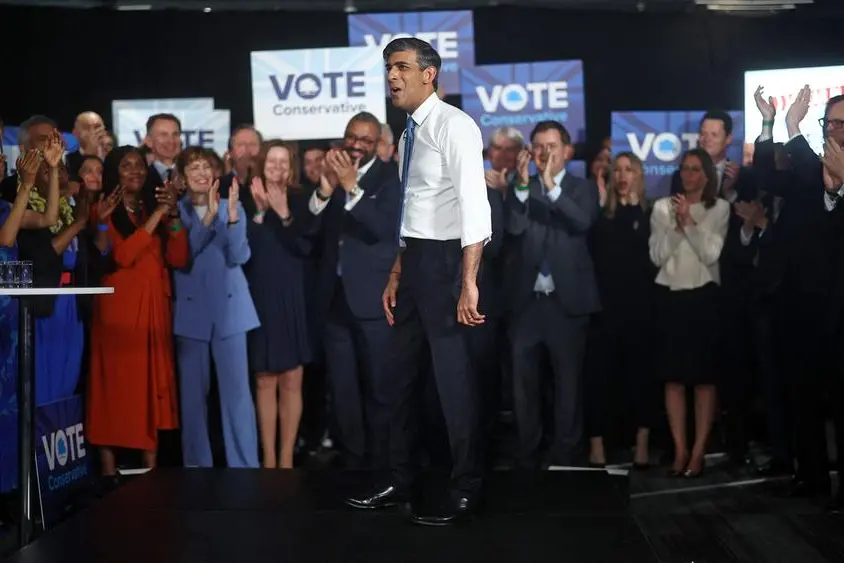PHOTO
UK political parties began jostling for position on Thursday, setting out their electoral battle plans after embattled Prime Minister Rishi Sunak called a general election for July 4.
Sunak ended months of speculation about the date of the vote in a rain-soaked speech Wednesday outside Downing Street, which some took as an omen for his Conservatives' chances at the ballot box.
The right-wing Tories, in power since 2010 but battered by Brexit, a slew of scandals and ideological infighting, have consistently trailed the main opposition Labour party in opinion polls for two years.
That gap has widened, prompting many commentators to predict a landslide win for Labour in what would be a remarkable reverse after a heavy defeat for the leftists in 2019.
Soon after Sunak's speech, a snap Survation poll of voting intentions put Labour on 48 points, its highest since November 2022 and a huge 21 points ahead of the Tories, on 27.
The online poll of more than 1,000 adults on Wednesday and Thursday also found that 43 percent of respondents said Labour leader Keir Starmer would make a better prime minister than Sunak.
Survation said the results were consistent with Labour's polling throughout 2023 and this year, and with other surveys that have suggested similar results.
The vote -- the first to be held in July in the UK since 1945, when Labour won -- will be Sunak's first national electoral test, as he was appointed Tory leader by his own MPs in October 2022.
A former financier, the 44-year-old Sunak presented his party as the safe choice in an increasingly dangerous world, and promised to "fight for every vote" to overturn the opinion poll deficit.
He also trumpeted the Tories as the party of economic stability, after inflation fell to under three percent and IMF data indicated faster growth in the UK than in Germany, the US and France.
Labour, he said, was an unknown quantity, accusing Starmer of ideological flip-flopping on policy to curry favour with voters.
- Policies -
Starmer, 61, was quick to respond after Sunak's speech, publishing a slick election video saying Labour would "stop the chaos" of Conservative rule and "rebuild Britain".
"If they get another five years they will feel entitled to carry on exactly as they are. Nothing will change," said Starmer, a former human rights lawyer and chief state prosecutor.
Labour also promises economic stability, saying the Tories' reputation for sound stewardship of the nation's finances remained stained by former premier Liz Truss's short-lived tenure.
Sunak replaced Truss after just 49 days, when her tax cut plans spooked financial markets, sinking the pound and increasing mortgage rates as households were already battling higher energy prices.
Starmer has also promised border security efforts to tackle record levels of irregular immigration.
Sunak wants to push on with his pledge to "stop the boats" crossing the Channel, even as his controversial plan to deport failed asylum seekers to Rwanda remains mired in legal challenges.
The official campaign gets underway five weeks before the election. Parliament will be prorogued -- suspending its current session -- on Friday, and formally dissolved next Thursday.
Voting for the 650 parliamentary constituencies in the lower House of Commons is under the "first past the post" system, with results expected on July 5 and a quick turnaround if one party secures a majority of seats.
The new parliament will be summoned to meet on July 9, when a new speaker will be elected and MPs sworn in. The formal State Opening will be on July 17.





















